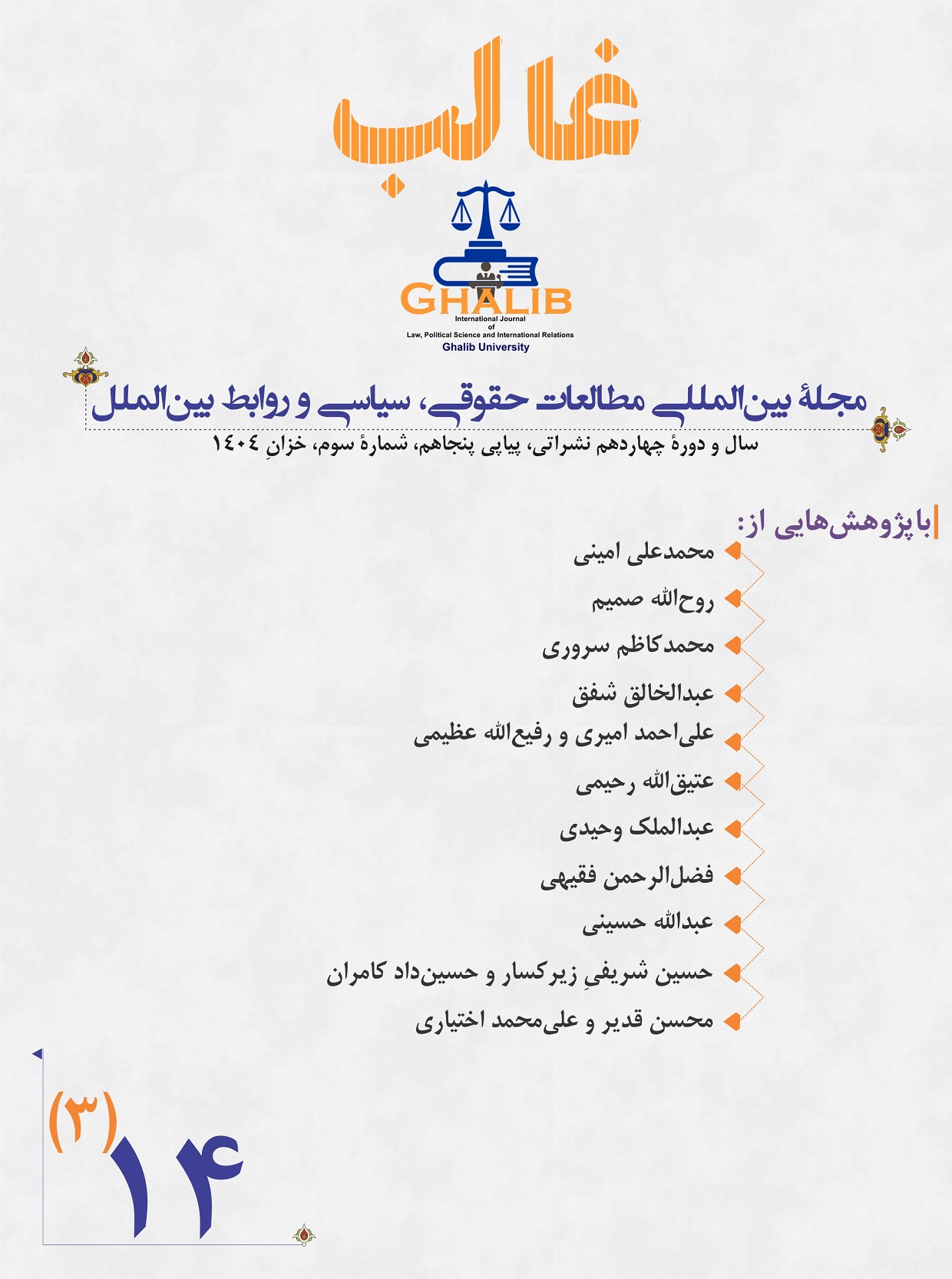Criminological Foundations for the Imperative of Reviving Informal Justice Mechanisms in Afghanistan
DOI:
https://doi.org/10.58342/ghalibqj.V.14.I.3.7Keywords:
Afghanistan, civil disputes, criminal cases, informal justice, mediation, social conflictsAbstract
Customary law plays a significant role in social interactions in Afghanistan, and many issues across various regions are resolved based on customary rules. The importance of this study arises from the fact that numerous disputes are settled through traditional assemblies such as Jirga, Markah, Ure, and Shura, which represent forms of informal justice in the country. Therefore, understanding the justification of customary decisions alongside the formal judicial system and examining the criminological rationale for reviving informal justice is crucial. The aim of this research is to assess the necessity and function of informal justice in Afghanistan and to analyze restorative decisions within social and legal contexts. The primary research question is how customary decisions are justified in the presence of the formal judicial system and why the revival of informal justice is necessary. This study employed a descriptive–analytical approach. Data collection tools included the analysis of national and international documents, field examination of decisions made by Jirga, Markah, and Shura, and library-based sources. The scope of the research encompassed various regions of Afghanistan, focusing on social and criminal disputes. The findings indicate that, given the social context, the revival of informal justice is essential, as restorative decisions not only address social conflicts at their roots but also reduce criminal proliferation, social animosities, and administrative costs. These outcomes align with the objectives of national and international legal frameworks and emphasize the importance of integrating informal justice within Afghanistan’s legal system.
References
Ardeshir Amir-Arjomand. (2002). Regional Documents on Human Rights. Tehran: Shahid Beheshti University. [In Persian]
Mohammad Bastenegar. (2001). Human Rights from the Perspective of Thinkers. Tehran: Sherkat-e Sahami Enteshar. [In Persian]
Abdolali Tavajohi. (2004). The Idea of Victim Protection and Its Place in the Global Context and Iran’s Legislative Criminal Policy, in Criminal Sciences (Collection of Articles in Honor of Professor Dr. Ashuri). Tehran: SAMT Publications. [In Persian]
Alireza Jamshidi. (2008). Participatory Approach in Iran's Criminal Policy (Doctoral Dissertation in Criminal Law and Criminology). Tehran: Shahid Beheshti University, Faculty of Law. [In Persian]
José Luis de la Cuesta. (2004). European Criminal Policy (Translated by Ali-Hossein Najafi Abrandabadi), in Criminal Sciences (Collection of Articles in Honor of Professor Dr. Mohammad Ashuri) (3rd ed.). Tehran: SAMT Publications. [In Persian]
Mehrdad Rayejian Asli. (2013). Victimology (2nd ed.). Tehran: Shahr-e Danesh Publications. [In Persian]
Mehrdad Rayejian Asli. (2013). Victimization of Victims of Abuse of Power in the Light of the Comparison of the Two Principles of Individual and Group Victimization, in New Developments in Criminal Sciences (Collection of Articles) under the supervision of Ali-Hossein Najafi Abrandabadi (2nd ed.). Tehran: Mizan Foundation. [In Persian]
Khadem Hossein Rahimi. (2011). Manifestations of Public Participation in the Resolution of Criminal Disputes in Afghanistan (Master’s Thesis in Criminal Law and Criminology). Tehran: Ahlul-Bayt University, Faculty of Law. [In Persian]
Mohammad Ashraf Rasuli. (2017). General Criminal Law of Afghanistan. Kabul: Wazheh Publications. [In Persian]
Howard Zehr. (2004). Restorative Justice (Translated by Hossein Gholami). Tehran: Majd Publications. [In Persian]
Mohammad Sadr Tohidkhaneh. (2009). General Criminal Law of Afghanistan (3rd ed.). Kabul: Max Planck Institute. [In Persian]
Ali Safari. (2004). “Victim Support and Civil Society Institutions.” Legal Research Quarterly, 40, 289–324. https://www.noormags.ir/view/fa/articlepage/539183/ [In Persian]
Pooneh Tabibzadeh & Reza Eslami. (2018). “The Impact of Restorative Justice on Achieving the Macro Objectives of Transitional Justice.” Criminal Law Research Journal, 6(23), 213–247. https://doi.org/10.22054/jclr.2018.17018.1315 [In Persian]
Mostafa Abbasi. (2003). New Horizons of Restorative Justice in Criminal Mediation (1st ed.). Tehran: Daneshvar Publications. [In Persian]
Alireza Abbasianfar. (2004). Dispute Resolution Councils as a Manifestation of Civil Participation. Tehran: Judiciary of Iran, Deputy of Social Affairs and Crime Prevention, Center for Press and Publications. [In Persian]
Gholam Haidar Allameh. (2017). General Criminal Law of Afghanistan (3rd ed.). Kabul: Wazheh Publications. [In Persian]
Hossein Gholami. (2007). “The Role of the Local Community in the Resolution of Criminal Disputes.” Journal of Law and Politics Research, 9(22), 7–36. https://www.sid.ir/paper/98075/fa [In Persian]
Siamak Fathollahi. (1998). “Participatory Criminal Policy from the Perspective of the United Nations Criminal Policy.” Correction and Rehabilitation Journal, 9, 4–9. http://noo.rs/fwnPJ [In Persian]
Constitution of Afghanistan, ratified in 2004. [In Persian]
Tony Marshall. (2005). What is Restorative Justice? In Restorative Justice (Collection of Articles) (Translated by Amir Samavati Pirooz). Tehran: Majd Publications. [In Persian]
Ne’matullah Nabavi. (2016). General Criminal Law of Afghanistan. Kabul: Wazheh Publications. [In Persian]
Ali-Hossein Najafi Abrandabadi. (1998). “Delinquency, Sense of Insecurity and Control (A Study of the French Committee on Violence and Delinquency and Its Recommendations on Criminal Policy).” Judiciary Legal Journal, 62(22), 33–73. https://civilica.com/doc/1801784/ [In Persian]
Ali-Hossein Najafi Abrandabadi. (2008). Restorative Justice, Translator’s Introduction, 2nd ed., in Jean Pradel, History of Criminal Thought (3rd ed.). Tehran: SAMT Publications. [In Persian]
Ali Najafi Tavana, Mohammad-Ali Asadi, & Mojtaba Naji-Zavareh. (2019). “Restorative Approach to Justice: Pathology and Performance Improvement.” Judicial Legal Views, 24(85), 217–247. https://jlviews.ujsas.ac.ir/article_703564.html [In Persian]
Basic Principles on the Use of Restorative Justice Programs in Criminal matters, The Economic and Social Council , General Assembly Resolution, 12/2002: www.un.org/docs/ecosoc/.../eres2002-12.pdf














